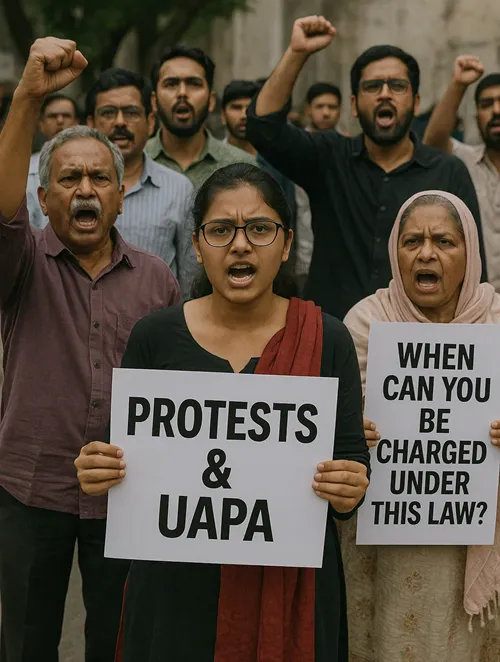
The Unlawful Activities (Prevention) Act, 1967 (UAPA) is India’s toughest anti-terror law. It is designed to fight terrorism, separatism, and activities that threaten the sovereignty and integrity of the nation.
This law gives wide powers to the government and investigative agencies, especially after amendments in 2008 and 2019. While it helps fight terrorism, it is also controversial due to concerns about misuse.
Key Features of UAPA
- Applies across India.
- Defines and punishes “unlawful activities.”
- Government can declare individuals as terrorists (since 2019).
- Organizations can be banned as “terrorist organizations.”
- NIA (National Investigation Agency) has nationwide authority to investigate.
- Police can hold suspects up to 180 days without filing a charge sheet.
- Bail is extremely difficult to obtain.
20 Common FAQs on UAPA
-
Q1: What is UAPA?
-
A: It is India’s primary anti-terror law to curb terrorism and activities against the nation’s unity.
-
Q2: What counts as an “unlawful activity”?
-
A: Actions, speeches, or writings that support terrorism, separatism, or threaten India’s sovereignty. Example: funding a banned group or calling for violent separatism.
-
Q3: Can individuals be declared terrorists?
-
A: Yes. Since 2019, the government can list not only organizations but also individuals as terrorists.
-
Q4: Who can be banned under UAPA?
-
A: Any organization or group that supports or engages in terrorism or unlawful activities.
-
Q5: Who investigates UAPA cases?
-
A: Mostly the NIA, but state police can also investigate with special powers.
-
Q6: How long can police keep someone without filing charges?
-
A: Up to 180 days (6 months) under UAPA, compared to 90 days under normal law.
-
Q7: Is bail possible under UAPA?
-
A: Very difficult. Courts usually deny bail unless the accused proves they are not guilty at all.
-
Q8: Can someone be arrested for a social media post?
-
A: Yes, if the post is considered as supporting terrorism, spreading hatred, or promoting violence.
-
Q9: What punishments does UAPA provide?
-
A: Jail terms from 7 years to life imprisonment, and in extreme terror cases, even the death penalty.
-
Q10: Can foreign nationals be booked under UAPA?
-
A: Yes, if they are found to be part of unlawful or terror activities in India.
-
Q11: Is UAPA bailable or non-bailable?
-
A: It is non-bailable. Accused rarely get bail.
-
Q12: Can property be seized under UAPA?
-
A: Yes, if it’s linked to terrorism or unlawful activities (like funding terror groups).
-
Q13: What is the difference between UAPA and regular laws?
-
A: UAPA is stricter — longer detention, limited bail, and more powers for NIA/police.
-
Q14: Can confessions to police be used directly for conviction?
-
A: No, courts still need independent evidence, but police confessions may influence investigations.
-
Q15: Can students or protestors be charged under UAPA?
-
A: Yes, in some cases protestors and students have been booked, which is why misuse concerns are raised.
-
Q16: Can UAPA be used only for terrorists?
-
A: It’s meant for terrorists, but critics say it has also been applied to activists, journalists, and dissenters.
-
Q17: Can a person challenge the “terrorist” tag?
-
A: Yes, by appealing before the UAPA Tribunal or in courts.
-
Q18: Can UAPA cases be heard in normal courts?
-
A: No, they are tried in special UAPA courts for faster trials.
-
Q19: What is the role of NIA under UAPA?
-
A: NIA can investigate across states without needing permission from state governments.
-
Q20: Why is UAPA controversial?
-
A: Because of its tough bail rules, long detention, and instances of being used against people beyond hardcore terrorists.
Add new comment